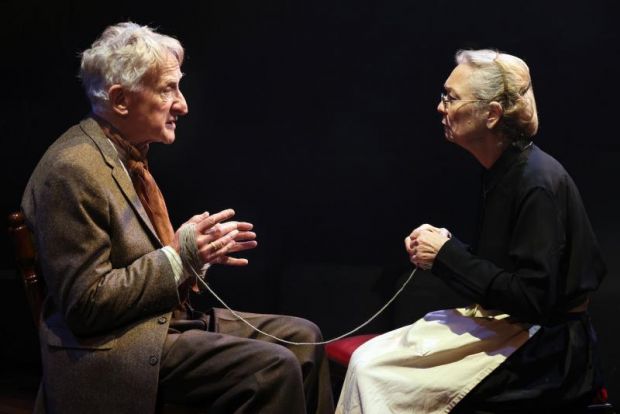By Anton Chekhov. Adapted by Joanna Murray-Smith. Ensemble Theatre. Director Mark Kilmurry. 26 Jul – 31 Aug, 2024
Reviewed : 31 July, 2024*

Adaptations only work in the hands of an exceptional and principled writer. Australian playwright Joanna Murray-Smith is both. Her adaptation of Anton Chekhov’s 1898 play Uncle Vanya is reverent to the style and intention of the famous Russian playwright, and the play’s enduring themes and ageless characters. This is an adaptation that really works.
The characters, their unfulfilled dreams, the emotional tension and the bleak environment in which Chekhov set them remain the same, but Murray-Smith has cleverly made them more ‘present’ by capturing what director Mark Kilmurry describes as “the colloquial language of the time with a clever contemporary essence (that) like a bright light, allows Chekhov’s humour to shine through”.
Kilmurry reaffirms that “contemporary essence” with clear, concise direction that highlights Murray-Smith’s tailored dialogue. He keeps the pace tight, building the tension that arises from the contrasts in the characters and their different frustrated dreams – but breaking it with moments of comedy that reveal Murray-Smith’s astute ability to translate Chekhov’s wry view of human relationships for a modern audience.

The play is set in nineteenth Russia on a country estate managed by Vanya and his niece Sonya. Designer Nick Fry hangs long velvet curtains in rusty colours to frame a hallway from which high glass doors lead into a living room lit by gas lamps. A bookcase holds odd ornaments, a samovar, glass teacups. A low red seat, a piano stool are the only bright colours. Fry’s costumes define the period but have a more contemporary feel.
Bare branches high on the walls and the sound of birdsong (composer and sound designer Steve Francis) symbolise the rustic setting that Matt Cox wraps in carefully judged lighting.
Yalin Ozuceik plays the title role of Vanya with an agitated energy that shows his frustration with the failing estate where any profit goes to his brother-in-law Serebryakov in the city. Ozuceik makes him agitated, nervy, a mixture of discontent juxtaposed with moments of wild humour and almost suicidal depression that are exacerbated when he falls in love with Serebryakov’s new young wife Yelena. With his niece Sonya and Nanny he is softer, almost hiding the resentful energy that consumes him.

Sonya is played by Abbey Morgan, making a striking debut at the Ensemble. She makes Sonya wiser than the naïve young woman she pretends to be. Her Sonya is percipient, observant, aware. She has a presence that demands the respect of the family. We see it in a judicious pause, a cold look, or a sharp rebuke that dissipates tension.
The older women in the household, Nanny and Vanya’s mother Maryia, are played by Vanessa Downing. Downing makes Nanny wisely calm. She knows the eccentricities of those she loves – and sees through the failings of others. She watches carefully, chides gently and cares unconditionally. As Maryia she is brittle, stiff and removed, only interested in social issues especially women’s rights.
Telyeghin, usually referred to as “Waffles”, is a failed landowner who works on the estate. John Gaden makes him a little bewildered, trying to keep up with the action, but often left behind, blinking confusedly, and clutching his guitar. When ignored by the arrogant doctor, Astrov, he backs off, the hurt evident in his face and eyes.
Astrov, played by Tim Walter, bemoans the lot of the country doctor, drowning his sorrows in Vanya’s vodka and sharing his woes with a besotted Sonya, totally unaware of her feelings for him and her hurt when he admits his infatuation with Yelena. Walter makes him self-absorbed, aloof but dependent upon the acceptance of the family.
David Lynch is Serebryakov, a bad-tempered aging hypochondriac who has decided to sell the estate to fund his old age. Lynch makes him loud and demanding – calling for tea at one in the morning – but weak and dependent on the care and attention of others. Serebryakov is not a likeable character and Lynch finds his conceit as well as his weakness and fear.

His bored young wife Yelena is played with jaded languor by Chantelle Jamieson. She is removed, edgy, quick to anger and disillusioned retreat, ignoring the family bickering around her and treating Vanya and Astrov’s advances with cutting disdain.
No one really wins in this cut and thrusts of opposites. Serebryakov and Yelena return to the city, leaving Vanya and Sonya to make what they can from the estate, with the bumbling help of Waffles. Astrov goes back to his home visits and Nanny to her knitting. What Kilmurry calls Chekhov’s “non-dramatic drama” leaves the characters where they began, and the audience wondering about the cycle of life – and what made them laugh so much.
The answer is a combination of Joanna Murray-Smith’s sensitive re-imaging of Chekhov’s characters and humour and Mark Kilmurry’s crisp direction of an intelligent cast who, like Chekhov, ‘got’ how comedy and pathos can work so cleverly together.
First published in Stage Whispers magazine
*Opening performance